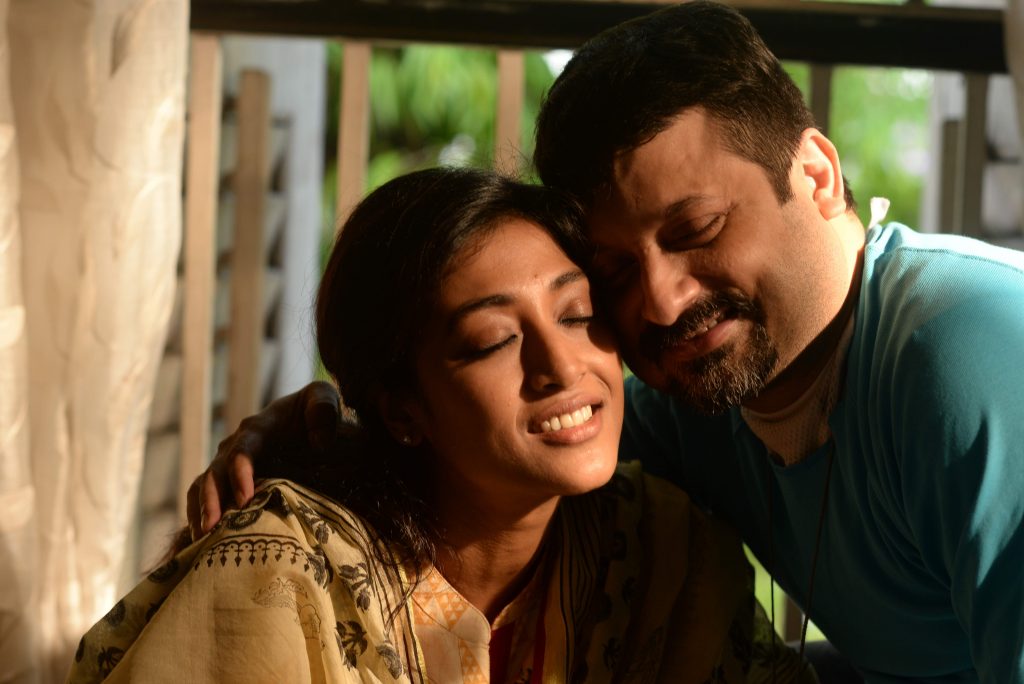Konttho (Voice) is based on a true story even if the tale is fictionalised for a mass audience adding in the drama demanded by a mainstream film. Arjun Mullick (Shiboprosad Mukherjeee) is a radio jockey whose very survival is centered on his voice. When the film opens, he is scheduled to win the award for the ‘Best Voice of the Year’. But he suddenly finds that his voice fails him when he has to deliver the awardee speech. He has throat cancer and needs to have his voice box removed. Konttho details Arjun’s journey from the debris his life has been reduced to towards resurrection in a new voice known in medical terms as the ‘oesophageal voice’.
Konttho opens with a number of conflicts and sets out to resolve these one by one, steadily and slowly, permitting the audience to absorb and digest a lot of information about throat cancer without stripping its narrative of colour, emotion and drama. On the home front, Arjun’s wife Pritha (Paoli Dam), an anchor/newsreader on a television channel, is devastated and post surgery, has to confront the sweeping changes in Arjun who finds it impossible to accept that he will never be able to speak ever and takes it out on everyone around him with his wife being the main target.
Romila (Jaya Ahsan), a speech therapist with a successful record in making throat cancer survivors find their voices, is about to leave for her hometown Dhaka in Bangladesh. Pritha somehow manages to persuade her to take on her husband’s case. A different struggle begins for all three. Romila, tries to enthuse Arjun not to give up and then trains him anywhere and everywhere. For instance, in a restaurant, she teaches Arjun to speak with his oesophageal voice, which is extremely tough for him both, emotionally and physically even as people are watching. Jaya Ahsan is outstanding in essaying the different layers of her character, a challenging one where she finds herself falling in love with Arjun who is already married and has a son.
Cancer in any form within the celluloid world has been mainly used as a strategy for heightened melodrama and an overload of histrionics. But directors Shiboprasad Mukherjee and Nandita Roy steer clear of filling the narrative with minute clinical details to focus instead mainly on the human drama that ensues when someone close to you is discovered suffering from cancer. The twists and turns are used almost in a violent manner where we find a family man with a successful career getting sucked into a new world of darkness and depression till Romila enters to change everything.
There is a small sub-plot that shows a senior cancer survivor (Paran Bandopadhyay) holding counselling sessions with patients suffering from throat cancer and teaching them to speak through their oesophageal voice. This is a marker for Arjun to take his place when the old man passes away. But the script suddenly lapses into tasteless bawdiness where the old man begins talking of how his illness has affected his sex life with his wife. This is like an ugly scar on a beautiful face. However, this is undercut by several other details filled with hope and love. Among these are the friends of Arjun and Pritha who rally around with their solidarity to offer support to the couple in distress. Konineeca Banerjee stands out with the soft heart hidden behind a colorful and loud personality. Another nice touch is when we see the couple’s small son backing away in fear from a father who has turned into a scary stranger for him. In one scene, Arjun pulls his son’s hand and makes him touch his scar and the gap between the father and the son fades away.
The songs are beautiful but perhaps, there are one too many. Special mention must be made of Shobai Chup sung beautifully by Sahana Bajpaie and composed by Prasun. It is presented through an imaginative collage of bits and pieces that put together the love story of Arjun and Pritha when they were in love, bonded by their love for voice-centered vocations. The cinematographer, Subankar Dhar, has put it together in the most picturesque manner – with raindrops falling on the earth, a flying umbrella to suggest the monsoon, the flying of dry leaves in autumn, the silhouetted figures of the lovers caught in a mid-long-shot under a tree and so on. Music plays an invisible character in the film, rising and falling with the rise and fall and rise in the drama of the lives of the three people in the film. The editing (Moloy Laha) is seamless and smooth moving between and among very different locations and homes while maintaining the pace and rhythm of the film. But the film would have done better with some clipping towards the end.
But the most amazing quality of the film lies squarely on Shiboprosad Mukherjee’s shoulders who portrays Arjun Mullick. That happy and cheerful look on his face backed by a very friendly and adorable voice is replaced by that lost look of disbelief in his eyes, his anger when he throws things around and his complete feeling of being a failure when nothing, but nothing seems to work. The directors have rightly underscored the lengthy and very painful process of Arjun working on his voice and regaining his lost confidence slowly bit by bit. When Arjun learns with rigorous practice to use his voice differently, he creates an ‘alien’ mechanised voice for his listeners and fans for a newly devised programme on the same channel he worked for. This defines a beautiful but imposed tribute to the Ghost King in Satyajit Ray’s Goopy Gyne Bagha Byne, which celebrated its 50th birthday two days before Konttho released. However it has to be said, Konttho would have ‘spoken’ with equal eloquence and emotion even without this tribute.
Bengali, Drama, Color


